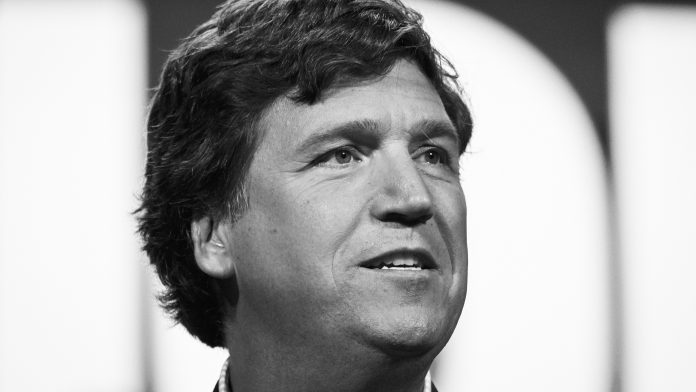In the movie The History Boys, based on Alan Bennett’s play, a student wins a scholarship to Oxford with the help of an argument he makes on an entrance exam: Hitler, he claims, was “much misunderstood.” As fiction, this is mordant comedy—a mockery of the particular type of arrogance required to twist the tragedies of the Holocaust into personal gain. But now the satire has come for our news cycle.
In a long and meandering interview on Tucker Carlson’s show this week, the podcaster Darryl Cooper offered musings about the “mythology”—the heroes, the villains, the plot, the moral stakes—of World War II. In his version, however, it is Winston Churchill who has been much misunderstood. Churchill, Cooper told Carlson, with dramatic flair, “was the chief villain of the Second World War.”
The claim is wrong, in every sense. The gravity of its error was highlighted by a resonant coincidence: Around the time the interview was posted, Alternative for Germany became the first far-right party to win a German state election since the Nazi era. The past is never dead, the old line goes; it is not even past. But Cooper and his enthusiastic host, these history boys with microphones, were not talking about history—not really. They were talking about themselves. They were treating World War II as a branding exercise. And this was, though not surprising in the context of Carlson’s show, a new nadir.
[Read: Tucker Carlson’s manufactured America]
Consensus reality relies on consensus history. In this time of fragile facts, one point most people have been able to agree on is that Hitler was a bad guy. But the time for consensus is over, Cooper implied. Instead, as a phrase in the title of his episode summed things up: “Winston Churchill Ruined Europe.”
What becomes clear during the interview, as Cooper makes his convoluted case (“maybe I’m being a little hyperbolic,” he allows at one point), is that the true villains of his story are not, in the end, Hitler or Churchill, Axis or Allies. Instead, they are the culture warriors of the present: the woke, the mobs, the ruling class—the people who will be offended by claims such as “Winston Churchill Ruined Europe.” And the true heroes, consequently, are those who dare to say the unsayable. “There are just certain things you’re not allowed to question,” Cooper told Carlson, as he questioned the “myths” of World War II. (“Literally, it’s a crime to ask questions?” Carlson replied, before answering his own query: “Yes.”) One might not go to jail for the myth-busting, Cooper allowed; still, “you might have your life ruined and lose your job.” (“You might absolutely go to jail in this country,” Carlson countered.)
[Read: American cynicism has reached a breaking point]
If your aim is to offer a clever reading of history rather than a true one, World War II will serve you well: Its excessive documentation is fertile ground, giving you many cherries to pick. It will provide the fodder you need to suggest that the Holocaust was, essentially, an unfortunate accident. And then it will allow you, if you choose, to treat the suffering of the people of the past as evidence for your own victimhood. You can take the accepted narrative and rewrite it.
In other contexts, Cooper and Carlson might have decried such an approach—an archly postmodern attitude in which all facts are relative, all orthodoxies suspect. But history boys need their straw men. And Churchill was the war’s true villain is less an argument than a provocation: a contention that, when World War II is mapped onto Hallin’s spheres, Hitler’s villainy should be relocated to the realm of legitimate controversy. It should be moved there because it is one of those things that you are not allowed to question. “Darryl Cooper may be the best and most honest popular historian in the United States,” Carlson’s show announced, in promoting the interview. “His latest project is the most forbidden of all: trying to understand World War Two.”
“Forbidden”—the stuff of perfumes, of clothing, of heterodox educational institutions—makes sense as branding. The forbidden is exotic. The forbidden is brave. The forbidden can transform history boys into men. And it can do all that from the comfort of one’s personal podcast studio.
[Read: Tucker Carlson’s final moments on Fox were as dangerous as they were absurd]
History, from such a distance, is easy. Carlson and Cooper can talk about being arrested for questioning orthodoxies with no fear of that actually happening. They can traffic in the mystique of the “forbidden” with no reference to the many things—books, ideas, people—that bear the real risk of being banned. They are free to speak their mind. They are free to do so, indeed, because of the actions of people who did not have the luxury of treating the Holocaust as a thought exercise. The influencers can, if they choose, interpret others’ indignation as their victory. They can brag that they have “weakened the narrative” about World War II. They can choose not to wonder what their questioning really amounts to. “History nowadays is not a matter of conviction,” a teacher in The History Boys announces. “It’s a performance. It’s entertainment.” His students still have time to age out of such arrogance, the film implies. Or at least they should.

















